Abstract
BACKGROUND: Identification of risk factors for sexually transmitted diseases (STDs) assists in development of treatment algorithms, which are potentially important components of STD control when microbiologic facilities are limited. METHODS: A cross-sectional study was performed to assess STD and HIV risk factors of 2285 women attending three family planning clinics in Dar-es-Salaam, Tanzania during 1991-92. Women were interviewed and examined for signs of STDs. Specimens were taken for laboratory diagnosis of HIV, other sexually transmitted organisms, and Candida albicans. RESULTS: The prevalence of gonorrhoea was found to be 4.2%, prevalence of trichomoniasis was 14.3%, and positive syphilis serology was found in 2.5% of women. Unmarried women were at increased risk of trichomoniasis (age-adjusted OR = 1.48 95% CI [1.12, 1.95]), gonorrhoea (age-adjusted OR = 1.81 95% CI [1.14, 2.86]) and syphilis (age-adjusted OR 1.5 [0.84, 2.68]). An increasing number of sexual partners in the past five years was associated with an increased risk of all STDs. Current use of the oral contraceptive pill was positively associated with gonorrhoea, multivariate OR = 1.75 95% CI [1.05, 2.93]. The prevalence of candidiasis was 11.5% and was not associated with any of the demographic or behavioural risk factors examined. Clinical diagnostic algorithms for STDs in this study population had relatively low sensitivity and low positive predictive value. CONCLUSION: Being unmarried and having a higher number of sexual partners were consistently associated with each STD, while the associations for other risk factors varied between STDs, emphasising the complexity of STD distribution. Further development of diagnostic algorithms and other methods for screening women for STDs are needed to reduce the impact of STDs and HIV in developing countries.
Full text
PDF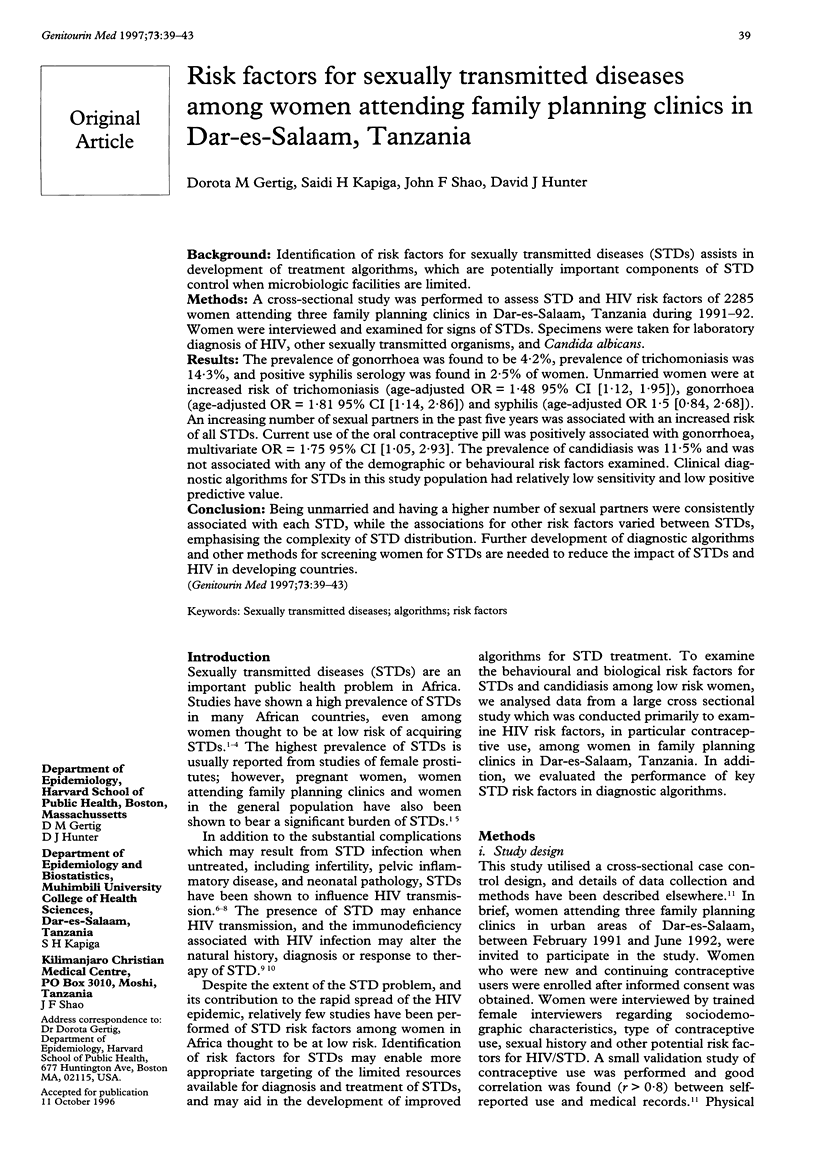
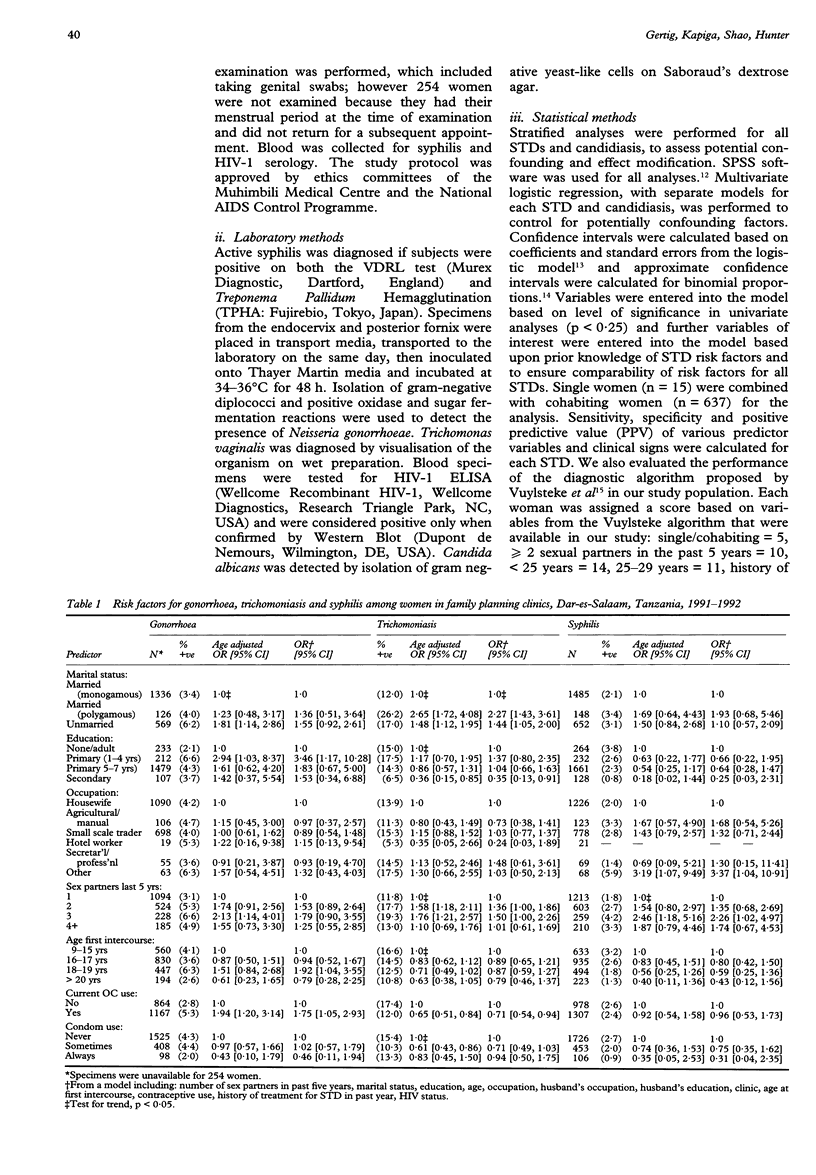
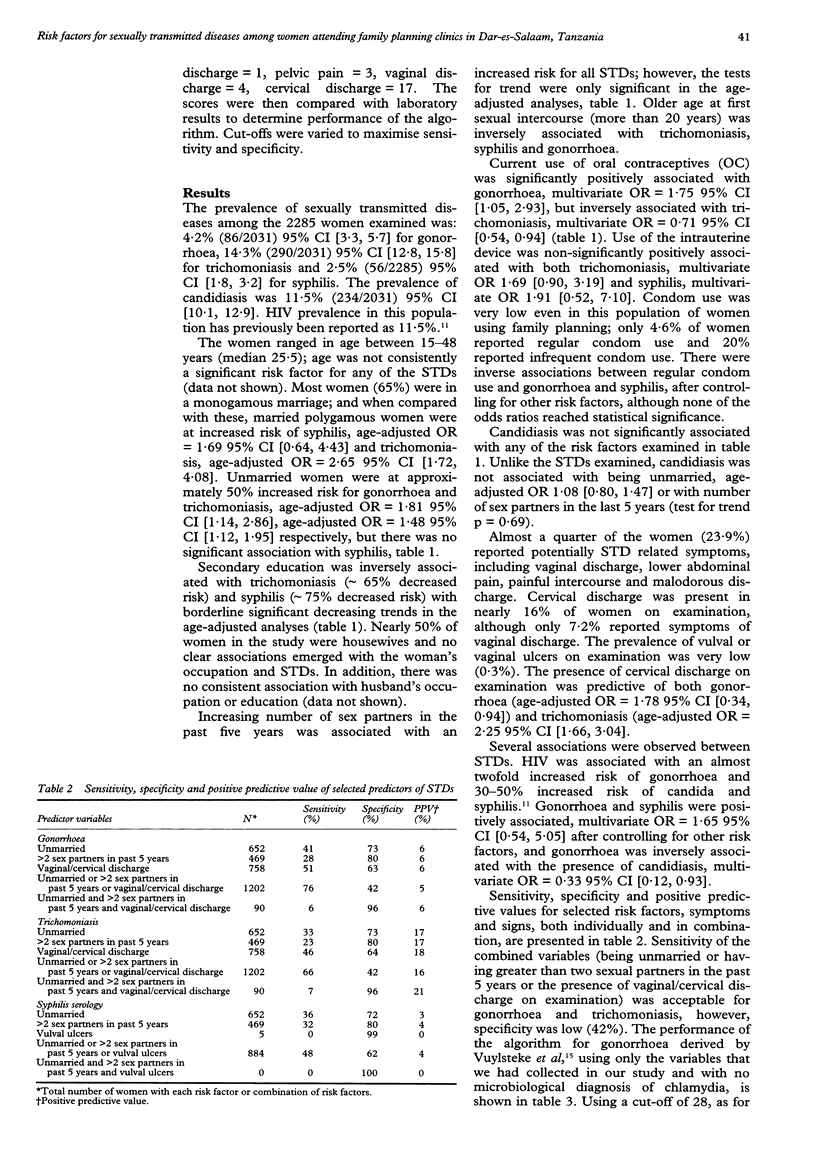
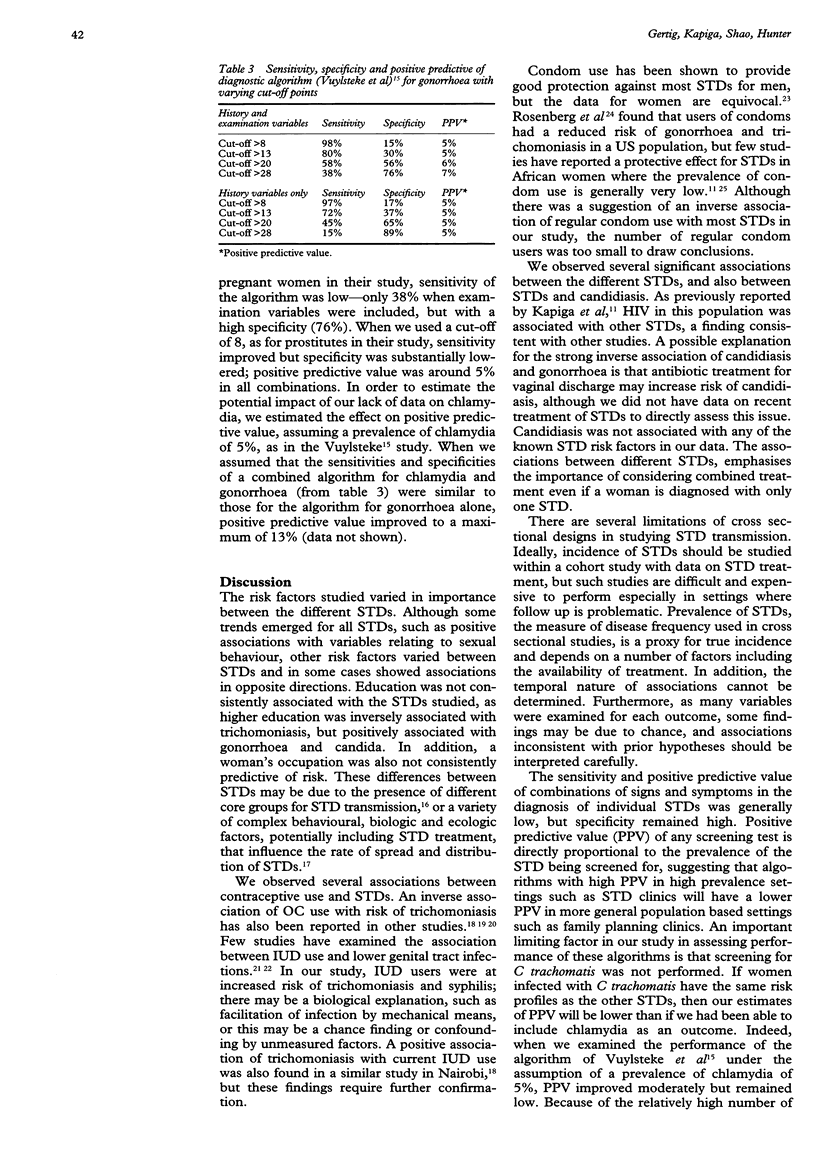
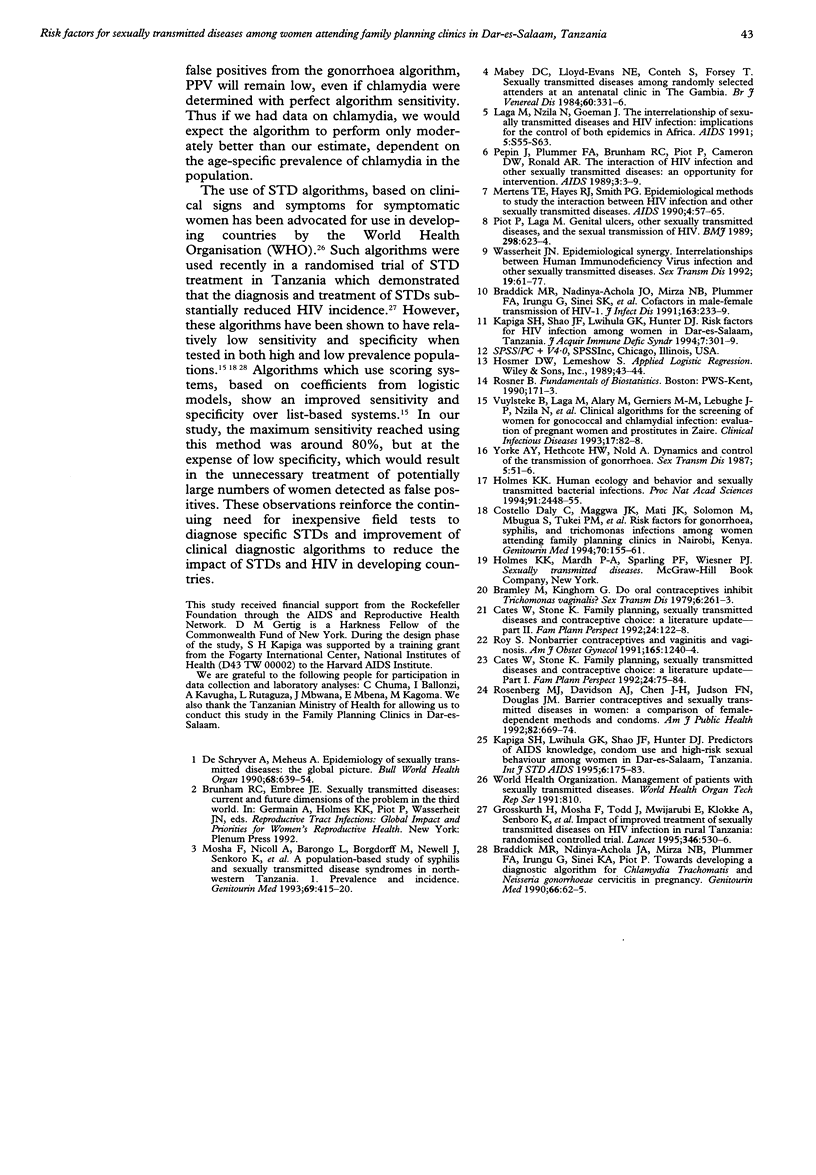
Selected References
These references are in PubMed. This may not be the complete list of references from this article.
- Braddick M. R., Ndinya-Achola J. O., Mirza N. B., Plummer F. A., Irungu G., Sinei S. K., Piot P. Towards developing a diagnostic algorithm for Chlamydia trachomatis and Neisseria gonorrhoeae cervicitis in pregnancy. Genitourin Med. 1990 Apr;66(2):62–65. doi: 10.1136/sti.66.2.62. [DOI] [PMC free article] [PubMed] [Google Scholar]
- Bramley M., Kinghorn G. Do oral contraceptives inhibit Trichomonas vaginalis? Sex Transm Dis. 1979 Oct-Dec;6(4):261–263. doi: 10.1097/00007435-197910000-00009. [DOI] [PubMed] [Google Scholar]
- Cates W., Jr, Stone K. M. Family planning, sexually transmitted diseases and contraceptive choice: a literature update--Part I. Fam Plann Perspect. 1992 Mar-Apr;24(2):75–84. [PubMed] [Google Scholar]
- Cates W., Jr, Stone K. M. Family planning, sexually transmitted diseases and contraceptive choice: a literature update--Part II. Fam Plann Perspect. 1992 May-Jun;24(3):122–128. [PubMed] [Google Scholar]
- Daly C. C., Maggwa N., Mati J. K., Solomon M., Mbugua S., Tukei P. M., Hunter D. J. Risk factors for gonorrhoea, syphilis, and trichomonas infections among women attending family planning clinics in Nairobi, Kenya. Genitourin Med. 1994 Jun;70(3):155–161. doi: 10.1136/sti.70.3.155. [DOI] [PMC free article] [PubMed] [Google Scholar]
- De Schryver A., Meheus A. Epidemiology of sexually transmitted diseases: the global picture. Bull World Health Organ. 1990;68(5):639–654. [PMC free article] [PubMed] [Google Scholar]
- Grosskurth H., Mosha F., Todd J., Mwijarubi E., Klokke A., Senkoro K., Mayaud P., Changalucha J., Nicoll A., ka-Gina G. Impact of improved treatment of sexually transmitted diseases on HIV infection in rural Tanzania: randomised controlled trial. Lancet. 1995 Aug 26;346(8974):530–536. doi: 10.1016/s0140-6736(95)91380-7. [DOI] [PubMed] [Google Scholar]
- Holmes K. K. Human ecology and behavior and sexually transmitted bacterial infections. Proc Natl Acad Sci U S A. 1994 Mar 29;91(7):2448–2455. doi: 10.1073/pnas.91.7.2448. [DOI] [PMC free article] [PubMed] [Google Scholar]
- Kapiga S. H., Lwihula G. K., Shao J. F., Hunter D. J. Predictors of AIDS knowledge, condom use and high-risk sexual behaviour among women in Dar-es-Salaam, Tanzania. Int J STD AIDS. 1995 May-Jun;6(3):175–183. doi: 10.1177/095646249500600307. [DOI] [PubMed] [Google Scholar]
- Kapiga S. H., Shao J. F., Lwihula G. K., Hunter D. J. Risk factors for HIV infection among women in Dar-es-Salaam, Tanzania. J Acquir Immune Defic Syndr. 1994 Mar;7(3):301–309. [PubMed] [Google Scholar]
- Laga M., Nzila N., Goeman J. The interrelationship of sexually transmitted diseases and HIV infection: implications for the control of both epidemics in Africa. AIDS. 1991;5 (Suppl 1):S55–S63. [PubMed] [Google Scholar]
- Mabey D. C., Lloyd-Evans N. E., Conteh S., Forsey T. Sexually transmitted diseases among randomly selected attenders at an antenatal clinic in The Gambia. Br J Vener Dis. 1984 Oct;60(5):331–336. doi: 10.1136/sti.60.5.331. [DOI] [PMC free article] [PubMed] [Google Scholar]
- Mertens T. E., Hayes R. J., Smith P. G. Epidemiological methods to study the interaction between HIV infection and other sexually transmitted diseases. AIDS. 1990 Jan;4(1):57–65. doi: 10.1097/00002030-199001000-00008. [DOI] [PubMed] [Google Scholar]
- Mosha F., Nicoll A., Barongo L., Borgdorff M., Newell J., Senkoro K., Grosskurth H., Changalucha J., Klokke A., Killewo J. A population-based study of syphilis and sexually transmitted disease syndromes in north-western Tanzania. 1. Prevalence and incidence. Genitourin Med. 1993 Dec;69(6):415–420. doi: 10.1136/sti.69.6.415. [DOI] [PMC free article] [PubMed] [Google Scholar]
- Pepin J., Plummer F. A., Brunham R. C., Piot P., Cameron D. W., Ronald A. R. The interaction of HIV infection and other sexually transmitted diseases: an opportunity for intervention. AIDS. 1989 Jan;3(1):3–9. [PubMed] [Google Scholar]
- Piot P., Laga M. Genital ulcers, other sexually transmitted diseases, and the sexual transmission of HIV. BMJ. 1989 Mar 11;298(6674):623–624. doi: 10.1136/bmj.298.6674.623. [DOI] [PMC free article] [PubMed] [Google Scholar]
- Rosenberg M. J., Davidson A. J., Chen J. H., Judson F. N., Douglas J. M. Barrier contraceptives and sexually transmitted diseases in women: a comparison of female-dependent methods and condoms. Am J Public Health. 1992 May;82(5):669–674. doi: 10.2105/ajph.82.5.669. [DOI] [PMC free article] [PubMed] [Google Scholar]
- Wasserheit J. N. Epidemiological synergy. Interrelationships between human immunodeficiency virus infection and other sexually transmitted diseases. Sex Transm Dis. 1992 Mar-Apr;19(2):61–77. [PubMed] [Google Scholar]
- Yorke J. A., Hethcote H. W., Nold A. Dynamics and control of the transmission of gonorrhea. Sex Transm Dis. 1978 Apr-Jun;5(2):51–56. doi: 10.1097/00007435-197804000-00003. [DOI] [PubMed] [Google Scholar]


